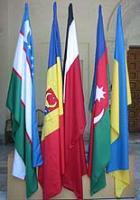Political associations of post-Soviet states unable to become opposition to Russia
The GUUAM block, which was originally established as an economic association of post-Soviet countries, has turned into a political organization

Presidents of the GUUAM block, comprised of Georgia, Ukraine, Uzbeskistan, Azerbaijan and Moldova gathered for the summit in Moldova's capital, Chisinau, of Friday, April 15th. It is noteworthy that Uzbekistan did not participate in the summit, which brings up the idea that the organization bears this name through habit only. Presidents of Romania and Lithuania arrived in Chisinau as well, although it was believed several days before that Polish and Hungarian leaders would take part in the summit too. 
Aside from those details, the block, which was originally established as an economic association of post-Soviet countries, has turned into a political organization. The presidents of the above-mentioned countries did not discuss any questions connected with commodity circulation or transport tariffs. The leaders were much more interested in the ways of democratic development from the Baltic region to Black Sea coasts. Georgian and Ukrainian presidents (Mikhail Saakashvili and Viktor Yushchenko) did not look odd as they played the role of democrats, whereas Moldavia and Azeri leaders (Vladimir Voronin and Ilkham Aliyev) created rather an awkward impression. The Moldavian president managed to find a spare minute to lay flowers to the monument of Vladimir Lenin (the summit took place on Lenin's birthday).
The Ukrainian president attempted to become the leader of the association: Yushchenko put forward a plan to regulate the Transdniestr conflict. The plan was titled “Seven Steps.” According to the plan, the Transdniestrian administration is supposed to create conditions for the development of the civil society and the multi-party system. Furthermore, Transdniestr should hold democratic elections to the Supreme Council; the EU, OSCE, Russia, USA and Ukraine will observe the election process. In addition, Yushchenko stands for the transformation of peacemaking forces in the international mechanism and the numerical expansion of Ukrainian peacemakers. Ukraine is also ready to support the USA and the EU in their actions to regulate the Transdniestrian conflict.
Romanian and Moldavian leaders objected to the initiative from the Ukrainian president. Georgian president joined the opposition as well. If Ukrainian initiatives are successful, they could be used for Georgia too. However, the president of Georgia is apparently not happy about such a perspective: Mr. Saakashvili has his own techniques. The Georgian president tried to grasp the initiative into his own hands and become the central figure of the summit, when he promised Europe “the third wave of revolutions” and said that Belarus would soon follow Kyrgyzstan's example.
As a result, the presidents of the four states passed the only one document: declaration for democracy, stability and development. The document proclaims the activation of measures for the development of democracy in GUUAM countries, the regulation of “frozen” conflicts, and unification of efforts for the European integration of the organization's members. A rather vague formulation indeed.
It is noteworthy that discord still dominates in the relations between members of the block. There is no reason to believe that GUUAM is becoming a new “sanitary cordon” around Russia.
Subscribe to Pravda.Ru Telegram channel, Facebook, RSS!


